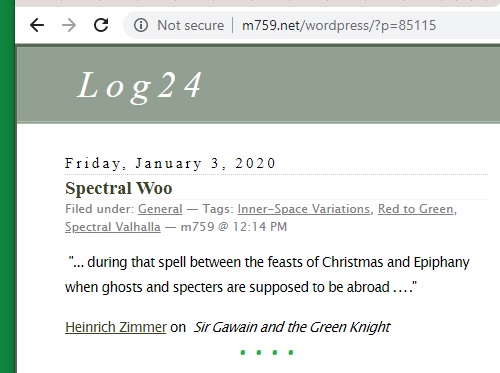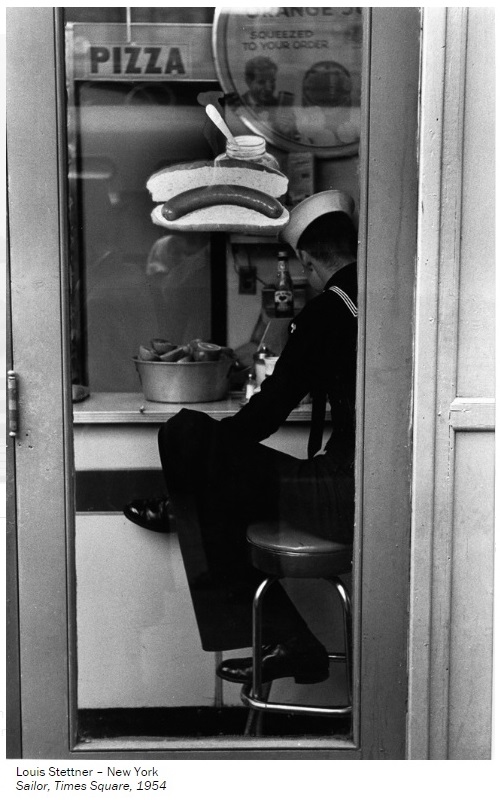Related material — http://m759.net/wordpress/?s=Ghost+Dog
Sunday, January 5, 2020
Dog Art
Saturday, October 11, 2003
Saturday October 11, 2003
The Mysterious West
Thanks again to KHYI, Plano, Texas, for great poetry. In tonight’s KHYI playlist…
From Spike and Jamie:
WAIT A WHILE AND YOU’LL GROW OLDER;
NEVER MIND WHAT THE OLD FOLKS SAY.
JUST KEEP AN ANGEL ON YOUR SHOULDER;
AND NEVER THROW YOUR DREAMS AWAY
FOR THEY MIGHT SAVE YOUR LIFE ONE DAY.
SONG IS JUST A BOX OF VISIONS;
YOU CAN UNLOCK IT WITH A KEY–
A MESSAGE ROLLED UP INSIDE A BOTTLE
AND DROPPED INTO THE SALTY SEA.
SONG IS JUST A BOX OF VISIONS,
A JAR OF HARPS AND GYPSY’S EARS,
A LABYRINTH OF WILD ROSES,
A JOURNEY THROUGH A HOUSE OF MIRRORS.
WAIT A WHILE AND YOU’LL GROW STRONGER;
NEVER MIND WHAT THE SAD FOLKS SAY.
From Tish Hinojosa:
“It’s the way of life in the real west…”
A search for information on the singer of “Real West” led to a site in Japan that mentions Hinojosa, among many other makers of recommended music:
From Japan–
“an example of understand beyond language is still possible”
Such an example is one of the themes in a movie I admire greatly….
Ghost Dog – The Way of the Samurai.
The hero’s understanding of what his friend says, even though he does not know the friend’s language, is a recurring theme in this film.
As for me… “No entiendo. Sigo trabajando.”
Monday, February 18, 2019
For Times Square…
and the Church of Synchronology
The date of the Urban Dictionary "Joy of Six"
article in this afternoon's previous post was Oct. 15, 2016.
A check of that date in this journal yielded a post titled "Word and Object"
that featured an image of a sailor in Times Square.
Related material encountered later this afternoon —
From the "Word and Object" post —
Friday, January 12, 2018
Saturday, October 15, 2016
Thursday, November 29, 2007
Thursday November 29, 2007
|
From today's online NY Times:
Obituaries in the News
By THE ASSOCIATED PRESS
Published: [Wednesday] Gennie DeWeese BOZEMAN, Mont. (AP) — Gennie DeWeese, an artist known for her landscape paintings and woodblock prints whose works are displayed at museums across the Northwest, died Monday [November 26, 2007]. She was 86. DeWeese died at her studio south of Bozeman. Dahl Funeral Chapel confirmed her death. Her first oil painting was of her dog, done when she was 12 years old. In 1995, DeWeese received an honorary doctorate of fine arts from Montana State University, and she received the Montana Governor's Award for the Arts. |
Robert M. Pirsig in
Zen and the Art of Motorcycle Maintenance
(April 1974) —
|
"The rhetoricians of ancient Greece were the first teachers in the history of the Western world. Plato vilified them in all his works to grind an axe of his own and since what we know about them is almost entirely from Plato they’re unique in that they’ve stood condemned throughout history without ever having their side of the story told. The Church of Reason that I talked about was founded on their graves. It’s supported today by their graves. And when you dig deep into its foundations you come across ghosts." I look at my watch. It’s after two. "It’s a long story," I say. "You should write all this down," Gennie says. |
Quod erat
demonstrandum.
For more information,
click on the black monolith.
Related material:
Saturday, August 3, 2002
Saturday August 3, 2002
Miss Sauvé
for the Sunday following Corpus Christi Day, 2002:
The part of her fiction that most fascinates me, then and now, is what many critics referred to as “the grotesque,” but what she herself called “the reasonable use of the unreasonable.” [Flannery O’Connor, Mystery and Manners: Occasional Prose, Robert and Sally Fitzgerald, eds. (New York: Farrar, Straus, 1969)]
A modest example comes to mind. In a short story …. the setting sun appears like a great red ball, but she sees it as “an elevated Host drenched in blood” leaving a “line like a red clay road in the sky.” [Flannery O’Connor, “A Temple of the Holy Ghost” from A Good Man is Hard to Find (New York: Harcourt, Brace & World, 1971)]
In a letter to a friend of hers, O’Connor would later write, “…like the child, I believe the Host is actually the body and blood of Christ, not just a symbol. If the story grows for you it is because of the mystery of the Eucharist in it.” In that same correspondence, O’Connor relates this awkward experience:
I was once, five or six years ago, taken by [Robert Lowell and Elizabeth Hardwick] to have dinner with Mary McCarthy…. She departed the Church at the age of 15 and is a Big Intellectual. We went and eight and at one, I hadn’t opened my mouth once, there being nothing for me in such company to say…. Having me there was like having a dog present who had been trained to say a few words but overcome with inadequacy had forgotten them. Well, toward morning the conversation turned on the Eucharist, which I, being the Catholic, was obviously supposed to defend. [McCarthy] said that when she was a child and received the Host, she thought of it as the Holy Ghost, He being the “most portable” person of the Trinity; now she thought of it as a symbol and implied that it was a pretty good one. I then said, in a very shaky voice, “Well, if it’s a symbol, to hell with it.” That was all the defense I was capable of but I realize now that this is all I will ever be able to say about it, outside of a story, except that it is the center of existence for me; all the rest of life is expendable. [Sally Fitzgerald, ed., The Habit of Being: The Letters of Flannery O’Connor (Vintage: New York, 1979) 124-125]
….There is, of course, something entirely preposterous and, well, unreasonable, almost grotesque, about the Catholic doctrine of the Real Presence. We claim, with a perfectly straight face, to eat the body and drink the blood of the Eternal Word of God, the second person of the Most Holy Trinity who, according to some, shouldn’t even have a body to begin with. But therein lies precisely the most outlandish feature of the Eucharist: namely, that it embodies the essential scandal of the Incarnation itself.
— Friar Francisco Nahoe, OFM Conv.
From James Joyce
A Portrait Of The Artist As A Young Man
Why was the sacrament of the eucharist instituted under the two species of bread and wine if Jesus Christ be present body and blood, soul and divinity, in the bread alone and in the wine alone? Does a tiny particle of the consecrated bread contain all the body and blood of Jesus Christ or a part only of the body and blood? If the wine change into vinegar and the host crumble into corruption after they have been consecrated, is Jesus Christ still present under their species as God and as man?
— Here he is! Here he is!
From The Gazette, Montreal,
of Sunday, August 20, 1995, page C4:
“Summer of ’69,” a memoir by Judy Lapalme on the death by accidental drowning of her 15-year-old younger brother:
“I had never tasted pizza until Jeff died. Our family, of staunch Irish Catholic stock with more offspring than money, couldn’t cope with the luxury or the spice.
The Hallidays, neighbors from across the street, sent it over to us the day after the funeral, from Miss Sauvé’s Pizzeria, on Sauvé St., just east of Lajeunesse St. in Ahuntsic. An all-dressed pizza with the hard hat in the centre….
I was 17 that summer and had just completed Grade 12 at Holy Names High School in Rosemont….
…. Jeff was almost 16, a handsome football star, a rebellious, headstrong, sturdy young man who was forever locking horns with my father…. On Friday, Aug. 1, Jeff went out on the boat… and never came back….
The day after the funeral, a white Volkswagen from Miss Sauvé’s Pizzeria delivered a jumbo, all-dressed pizza to us. The Hallidays’ daughter, Diane, had been smitten with Jeff and wanted to do something special.
My father assured us that we wouldn’t like it, too spicy and probably too garlicky. There could not be a worse indictment of a person to my father than to declare them reeking of garlic.
The rest of us tore into the cardboard and began tasting this exotic offering — melted strands of creamy, rubbery, burn-your-palate mozzarrella that wasn’t Velveeta, crisp, dry, and earthy mushrooms, spicy and salty pepperoni sliding off the crust with each bite, green peppers…. Bread crust both crisp and soggy with tomato sauce laden with garlic and oregano.
It was an all-dressed pizza, tasted for the first time, the day after we buried Jeff….
The fall of 1969, I went to McGill…. I never had another pizza from Miss Sauvé’s. It’s gone now — like so many things.”
Ten thousand places
— Gerard Manley Hopkins, 1844-1889
American Literature Web Resources:
Flannery O’Connor
She died on August 3, 1964 at the age of 39.
In almost all of her works the characters were led to a place where they had to deal with God’s presence in the world.
She once said “in the long run, a people is known, not by its statements or statistics, but by the stories it tells. Fiction is the most impure and the most modest and the most human of the arts.”
Flannery OConnor – Southern Prophet:
… When a woman wrote to Flannery O’Connor saying that one of her stories “left a bad taste in my mouth,” Flannery wrote back: “You weren’t supposed to eat it.”







